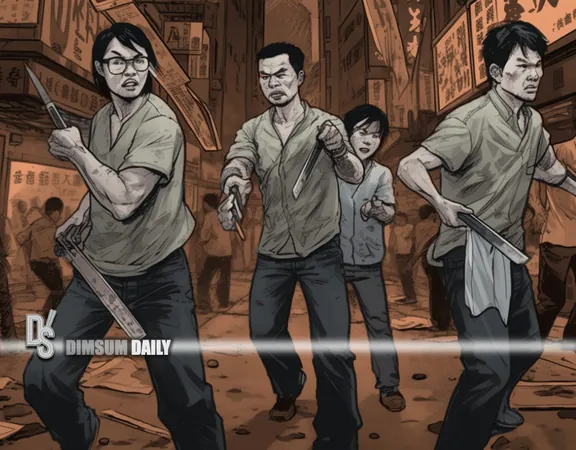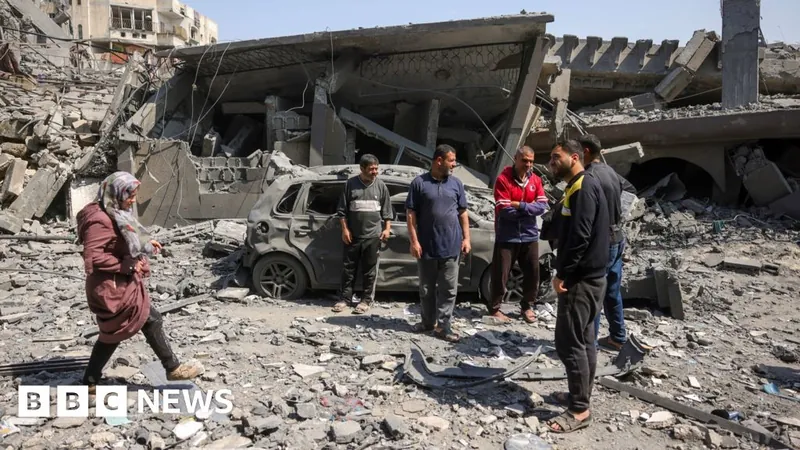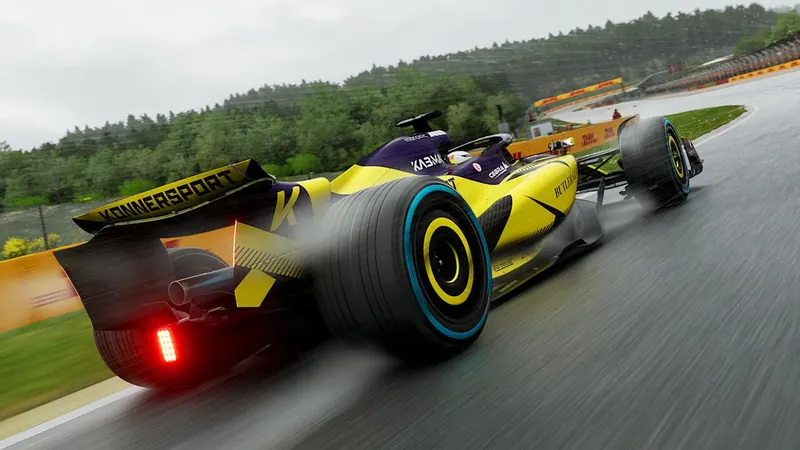
Hong Kong's Streets Run Red: Triad Violence Reaches Alarming New Heights!
2025-03-18
Author: Ming
March 18, 2025 – In a shocking display of lawlessness, the brutal daylight execution of a 52-year-old man in Fo Tan has thrown the spotlight on Hong Kong’s escalating nightmare of triad-related violence. The assailants, armed with knives, carried out the gruesome attack during peak rush hour before making a swift getaway in a taxi, showcasing the alarming audacity and impunity of criminal elements in a city once famed for its safety.
The senseless murder, reportedly orchestrated over a mere HK$30,000 debt, underscores the disturbing normalization of extreme violence in Hong Kong’s criminal underworld. This incident follows January's harrowing attack in Yuen Long, where a group of over ten armed men brutally hunted down two young victims in broad daylight, resulting in the death of a 24-year-old and serious injuries to another. In fact, the city saw three similar brazen assaults unfold within just one week, indicating a chilling trend where triads operate without fear or restraint, treating public spaces as their battleground.
Investigative data paints a grim picture of this escalating violence. Crime rates surged by 5% in 2024, with approximately 94,747 reported incidents including a staggering 10,485 violent crimes—a 3.6% rise from the previous year. Alarmingly, the solve rate for these crimes stands at a dismal 30.4%, suggesting a widespread failure of justice that leaves criminals unaccountable and emboldened.
What’s more, growing allegations of collusion between police and triads raise profound concerns about law enforcement integrity. Earlier this year, the arrest of seven police officers involved in a multi-million dollar money laundering operation in the New Territories revealed a shocking depth of corruption within the very institutions meant to uphold public safety. Past incidents, including a senior anti-triad officer caught hoarding drugs in his operational base, only amplify this crisis of trust.
Hong Kong's anti-triad initiatives now appear as little more than theatrical performances lacking real effectiveness. Operations like the annual Operation Thunderbolt, a collaboration with mainland authorities, serve primarily as spectacle rather than substantive action against crime, resulting in the apprehension of low-level offenders while leaving major figures untouched. The police response often escalates only during times of public outrage, quickly dwindling back to inactivity once media attention fades.
Compounding the issue, criminal organizations have adapted and evolved, utilizing fake refugees as enforcers and diversifying their operations into sophisticated scams. Authorities’ efforts to combat organized crime are hampered by a paradoxical situation where billions are spent supporting asylum seekers—some of whom become integrated into these very criminal enterprises.
The transformation of triads from clandestine societies into overtly aggressive street gangs mirrors the recent political shifts in Hong Kong. Once romanticized as guardians of tradition in their opposition to imperial rule, today’s triads have evolved into organized crime syndicates with significant influence in legitimate sectors and potential connections to political figures.
Today’s triads bear little resemblance to their storied pasts. The concept of camaraderie and honor has been overshadowed by ruthless capitalism, as these modern entities operate more like violent corporations. Young recruits carry out brutal hits while their older supervisors disguise themselves among legitimate businesses, crafting an illusion of respectability.
The chilling methodology of the Fo Tan murder—with masked attackers utilizing a getaway taxi and planned escape routes—reflects the calculating nature of contemporary triad violence. These acts of brutality are not spontaneous; they are strategically executed to assert dominance and project untouchability. The boldness of such actions, occurring under the scrutiny of numerous security cameras and witnesses, speaks volumes about the dire state of law enforcement in Hong Kong.
Unless urgent and effective measures are enacted to reform law enforcement and dismantle the links between police and organized crime, Hong Kong could find itself in a grim reality where escalating triad violence becomes not just common but frighteningly expected. As the streets run red, the question remains: how will the city reclaim its legacy of safety and peace?



 Brasil (PT)
Brasil (PT)
 Canada (EN)
Canada (EN)
 Chile (ES)
Chile (ES)
 Česko (CS)
Česko (CS)
 대한민국 (KO)
대한민국 (KO)
 España (ES)
España (ES)
 France (FR)
France (FR)
 Hong Kong (EN)
Hong Kong (EN)
 Italia (IT)
Italia (IT)
 日本 (JA)
日本 (JA)
 Magyarország (HU)
Magyarország (HU)
 Norge (NO)
Norge (NO)
 Polska (PL)
Polska (PL)
 Schweiz (DE)
Schweiz (DE)
 Singapore (EN)
Singapore (EN)
 Sverige (SV)
Sverige (SV)
 Suomi (FI)
Suomi (FI)
 Türkiye (TR)
Türkiye (TR)
 الإمارات العربية المتحدة (AR)
الإمارات العربية المتحدة (AR)